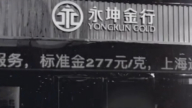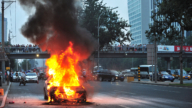【新唐人2014年05月06日讯】去年,中国新增委托贷款窜升为2万5500亿,成为房地产等产能过剩行业的主要资金来源。目前中国这种独有的委托贷款形式,不只局限在上市公司等,从银行低息贷款后,再委托银行高利放出贷款,银行也在设法参与。专家指出,这种中国独有的委托贷款,在增加实体经济成本的同时,正形成多米诺骨牌效应击垮中国经济,最终还会导致大量印制钞票,把危机转嫁给民众。
根据央行发行的《2013年社会融资规模统计数据报告》,去年,新增委托贷款窜升到2万5500亿,比2010年增长了190%多,在社会融资规模中跃居第二位。相当于全年新增人民币贷款的29%。
据美国《华尔街日报》报导,能够获得信贷的大型上市公司,是委托贷款的踊跃提供者,这些企业不投资自己的核心业务,而是将手中资金以高于官方数倍的利率,借给资金紧缺的企业, 有的利率高达24.5%.
而银行通常作为委托贷款的中间机构,向借贷双方收取费用,中共央行的官员表示,在实践中一些银行已经将自己的资金伪装成委托贷款,从而规避贷款方面的监管限制。
美国南卡罗莱纳大学艾肯商学院教授谢田:“这也是在中国银行出现钱荒,金融不健全,特权利益横行这样一个社会才会出现,其它正常国家,你很少见到一个公司它会去从事贷款业务,因为这不是它的业务范围,也不是它所精通的,他们也不知道它的风险,公司即使有多余的资金一般会用来自己的再发展,或自己的再投资。”
中国金融智库研究员巩胜利:“银行没有利润可以赚,它才不做了,委托了以后,它把钱又让人家来赚,高利润来赚,它又赢得自己的好处,到了真正用钱的人手里面都成了高息,第二、对这个市场形成了一种紊乱的钱流,第三点、很可能就还不起。”
据报导,这些委托贷款,大部分投资在房地产等产能过剩行业。2011年,中国大约有21%的委托贷款,流入房地产市场。
现在委托贷款正面临大量违约。4月中旬,造船商“舜天船舶”披露,借给某地产开发商的9亿元人民币贷款,没有收到对方应付的本金和利息。同一天,“洽洽食品”也宣布正在进行一笔有关4千万元人民币贷款利息的诉讼。湖北“宜化化工”、“宁波波导”等上市公司,目前也都有借给地产商的委托贷款面临违约。
谢田:“中国现在房地产市场的泡沫已经开始破灭,所以这一些巨额的高利贷很快也会跟着破灭,等于说把中国房地产业的风险和危机蔓延到其它行业去了,它实际上会造成全社会整体经济的连锁反应,随着破产和危机扩展到全社会的各个角落。”
大陆经济学者邓先生:“风险我认为是全面的,整个社会现在各行各业都感受到这一点了,接下来就面临节节败退和破裂,产能过剩的释放或者消化,接下来就是国家印钱来抵御风险,银行历来抵消这些风险的结果就是逼着国家印钱、国家印钞票,就是一种变相的抢劫。”
据报导,中国建设银行是抵押贷款的领头羊,去年末,“建行”委托贷款业务规模,达人民币1万4000亿元。
另外,由于委托贷款风险,基本上是由委托人承担,银行在借款人审核、监督贷款的投放和收回上缺少动力,在委托贷款的监管上也会出现漏洞。
2006年,抵押贷款还遭到媒体抨击,媒体声称抵押贷款是一片“灰色地带”,特别是变相委托贷款,猫腻太多风险太大。银行想贷款给某家房地产公司时,就会拉来另一家公司的存款,然后用委托贷款的名义贷出去。
不过从去年11月份开始,中共银监会已经公开鼓励银行,用委托贷款等方式扩大兼并重组资金来源。
大陆经济学家邓先生指出,在市场萎缩、消费不振的情况下,加上委托贷款带来的资金成本增加,没有企业家再去经营实体,造成的社会危机会不可收拾。
采访编辑/刘惠 后制/李智远
Who Will Pay for Default Entrusted Loans in China?
Last year in China, the number of entrusted
loans increased by a net 2.55 trillion yuan.
The main source of these loans
are industries such as real estate.
Currently, this unique type of entrusted loan in
China is not only limited to the listed companies.
These companies took low-interest loans from a bank
and entrusted the bank to release it with high interest.
Now, banks are trying to get involved as well.
Experts point out that these entrusted loans may crash the
economy, because of a domino effect from increasing costs.
The subsequent crisis of mass printing money
will also be shifted to impact the general public.
According to China Central Bank’s 2013 Social
Financing Report, new entrusted loans increased
by a net 2.55 trillion yuan ($407.38 billion) last year.
This reflects a 190% increase from 2010, an equivalent
of 29% of all new yuan bank loans issued during the year.
WSJ reported that large, publicly traded
companies with access to credit, are among
the most active providers of entrusted loans.
These companies, instead of investing in their core
businesses, lend funds at hand to cash-strapped
businesses at several times the official interest rate.
Banks make money by charging fees to both
the lending company and the borrower.
However, in practice, some banks have disguised loans
made with their own capital as entrusted loans, thereby
helping them skirt regulatory limits on lending, reports WSJ.
Professor Frank Xie, School of Business,
University of South Carolina Aiken: “This
will only happen in a society like China.
In China, there is a shortage of money, an unhealthy
banking system, and rampant privileged interests.
This is rarely seen in a normal country, because
it is not what an ordinary company would do.
It is outside of its business core and profession,
with a risk that’s beyond its capacity.
Excess funds will be used for further
development or reinvestment."
Gong Shengli, researcher, Chinese Financial
think tank: “Banks won’t do it if there’s no profit.
They allow people to make high profits, but, it with
high interest rates to those who really need the money.
Secondly, it may create disorder
for the flow of money in the market.
Thirdly, it is possible that people
can’t afford to pay the loans back."
According to reports, these entrusted loans were mostly
invested in real estate and other overcapacity industries.
In 2011, about 21% of all entrusted
loans went into the property sector.
Now, these entrusted loans are facing a lot of default.
In mid-April, Sainty Marine said an
entrusted loan it made had gone bad.
A local property developer failed to
repay 90 million yuan, plus interest.
On the same day, Qiaqia Food also announced
an ongoing lawsuit over a 40 million yuan loan.
Listed companies such as Hubei Yihua Chemical
Industry, and China Bird are facing entrusted
loans defaults from real estate developers.
Professor Frank Xie: “Now China’s real estate is facing
the bubble bursting, and other huge usury bursts.
The spread of the real estate crisis to other industries
will cause a chain reaction in the entire economy.
It will lead to bankruptcy and
crisis in every corner of society."
Mr. Tang, economist: “I believe it
will be a comprehensive collapse.
Everybody can feel it now. The next stage will
be the release or digestion of this overcapacity.
More money will be printed to resist the risks.
That’s what the banks have pushed the
state to do. Printing money to offset risk.
However, money printing is disguised robbery."
It is said that the China Construction Bank
(CCB) is the leader of entrusted loans.
At the end of last year, CCB entrusted
loans reached 1.4 trillion yuan.
In addition, banks lack motivation to audit and supervise
loans, since the risk is basically borne by the clients.
Therefore, there might be loopholes
over supervision of entrusted loan.
In 2006, media criticized mortgage loans as a
grey industry, with too many pitfalls and risks.
This is especially so with disguised-loans.
The bank may loan a real estate company with money from
another company’s deposits, in the name of entrusted loans.
However, the China Banking Regulatory Commission
(CBRC) has publicly encouraged banks to enlarge
the merge and recombination of funding sources
through entrusted loans since last November.
Economist Mr Zheng says that with a shrinking
market, stagnant consumption, and increased
costs from entrusted loans, entrepreneurs
have given up on running real businesses.
Consequently, social crises will become unmanageable.
Interview & Edit/Liu Hui Post-Production/Li Zhiyuan






























